#Nurses of the Windrush
Explore tagged Tumblr posts
Text
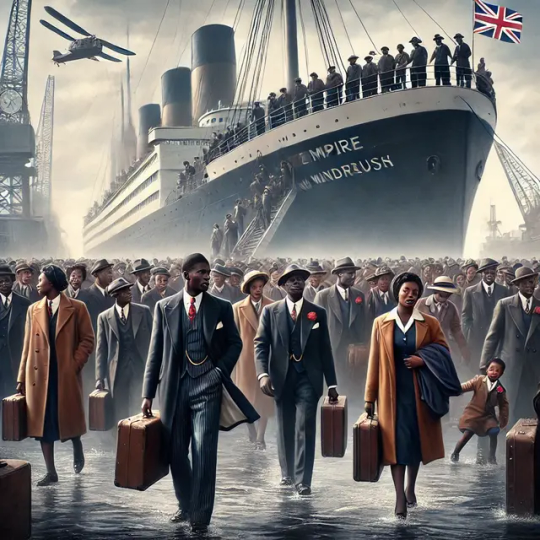
Afro-Caribbean Migration and the Windrush Generation: A Garveyite Perspective
The Windrush Generation, the wave of Afro-Caribbean migrants who arrived in Britain between 1948 and the early 1970s, represents one of the most significant movements of Black people in the 20th century. These migrants came with hopes of economic opportunity, stability, and full participation in British society—only to be met with racism, systemic exclusion, and second-class citizenship. From a Garveyite perspective, this migration was not a success story of integration but a continuation of colonial exploitation, where Black labour was welcomed, but Black people were never truly accepted.
Marcus Garvey warned Black people that seeking equality in white-dominated societies was a trap—one that would always position them as outsiders, no matter how much they contributed. The true path to liberation, according to Garveyism, was not integration but self-determination, economic independence, and repatriation to Africa. Through this lens, the Windrush Generation’s struggles with racism, economic marginalization, and political betrayal were predictable outcomes of a system designed to exploit, not uplift, Black people.
1. The Colonial Roots of the Windrush Migration
The British Empire spent centuries enslaving, exploiting, and underdeveloping the Caribbean, extracting wealth while keeping Black people in a state of economic dependency. After World War II, Britain faced a labour shortage and turned to its former colonies for cheap labour.
A. The Illusion of British Citizenship
Caribbean people were legally British subjects, yet this citizenship was conditional on their usefulness to the empire.
Britain actively recruited Caribbean workers to rebuild its economy, presenting the idea that they were coming to a “motherland” that welcomed them.
This was a lie—they were only seen as labourers, not equals.
Example: The arrival of the HMT Empire Windrush in 1948 was symbolic of how Black people were invited to contribute to Britain’s economy but denied full participation in its society.
Key Takeaway: The British Empire never intended to treat Caribbean migrants as equals—it only needed their labour, not their presence.
2. Betrayal and Racism: The Windrush Experience in Britain
Upon arrival, Afro-Caribbean migrants were met with hostility, racism, and segregation, contradicting the British promise of inclusion.
A. Employment and Economic Exploitation
Windrush migrants were given low-paying, undesirable jobs in public transport, the NHS, and manufacturing.
White workers resented their presence, despite their essential contributions.
Discrimination in hiring and promotions kept many in poverty, despite their skills and qualifications.
Example: Many Black professionals, such as teachers and nurses, had their qualifications dismissed and were forced into menial labour.
B. Housing Discrimination and Social Rejection
Black migrants were refused housing by landlords with “No Blacks, No Irish, No Dogs” signs.
Many were forced into overcrowded, poorly maintained accommodations in segregated areas.
The government did nothing to address racial inequality, leaving Black people in economic and social isolation.
Example: Notting Hill Riots (1958)—White mobs attacked Black communities, proving that Britain’s “inclusion” was a lie.
Key Takeaway: Black people were brought in to serve Britain, not to be part of it. Their contributions were necessary, but their presence was unwanted.
3. The Windrush Scandal: The Final Betrayal
Decades after their arrival, the British government launched the Windrush Scandal (2018), deporting and stripping the rights of the very people who built modern Britain.
A. How Britain Used and Discarded the Windrush Generation
In the 2010s, the UK government began deporting Afro-Caribbean elders, claiming they were illegal immigrants.
Many lost jobs, homes, and access to healthcare due to racist immigration policies.
The same people who were invited to rebuild Britain were now being exiled from it.
Example: Elderly Windrush migrants who had lived in Britain for 50+ years were suddenly detained and deported, despite being legal residents.
Key Takeaway: This was proof that Black people would never be considered truly British, no matter how much they contributed.
4. The Garveyite Perspective: Afro-Caribbeans Must Prioritize Self-Determination Over Integration
Marcus Garvey predicted this long ago—integration into white nations is not liberation, but subjugation.
A. The Failure of Seeking Acceptance in White Societies
Windrush migrants spent decades building Britain, only to be discarded when they were no longer needed.
Assimilation into a white nation will never lead to true equality—Black people will always be second-class citizens.
Relying on white governments to recognize Black contributions is a mistake.
Example: Garvey warned that Black people must never beg white nations for rights but must build their own institutions instead.
B. The Need for Economic Independence and Pan-Africanism
Caribbean nations remain economically dependent on Britain, just as Windrush migrants remained dependent on a racist state.
The solution is Pan-African economic self-sufficiency—building Black-owned businesses, schools, and governments free from European control.
Caribbean people must stop seeing Britain as a future and look toward Africa, the Caribbean, and Black nations for their destiny.
Example: Garvey’s UNIA movement aimed to create a Black nation built by Black people, not dependent on white acceptance.
Key Takeaway: Afro-Caribbean people must stop seeking approval from Britain and instead build economic and political power for themselves.
5. The Future: Reparations, Repatriation, and Black Sovereignty
The Windrush Generation’s story is not just one of migration—it is a warning about the dangers of Black dependence on white systems.
Britain owes reparations for the exploitation, racism, and betrayal of Afro-Caribbean migrants.
Afro-Caribbean youth must shift their focus away from Britain and toward Black economic and cultural independence.
Repatriation to Africa, economic investment in the Caribbean, and Pan-African unity must replace the outdated belief that integration into European society is the path to freedom.
Example: Marcus Garvey’s dream was a self-sufficient Black world, where no Black person had to beg a white government for survival.
Final Takeaway: The Windrush Generation’s suffering proves that Black people must build for themselves—because white nations will always turn their backs on them.
#blog#black history#black people#blacktumblr#black tumblr#pan africanism#black#black conscious#africa#Windrush Generation#marcus garvey#Black Self Determination#Windrush Scandal#caribbean history#afro caribbean#black liberation#UK#black uk#Garveyism#Garveyite#black british
53 notes
·
View notes
Text


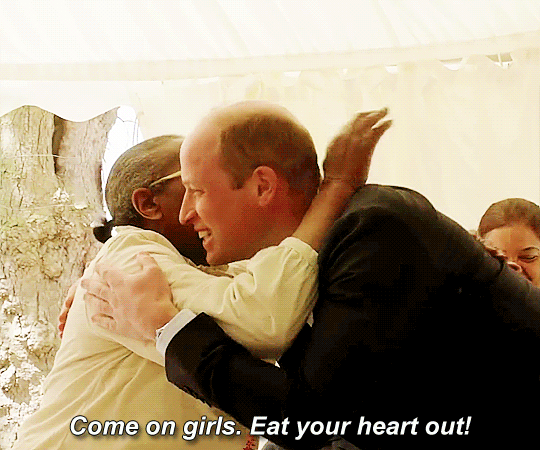
The Prince of Wales meets Blanche Hines, Windrush generation nurse of nearly 50 years, at the NHS Big Tea Party
311 notes
·
View notes
Note
hello, cool blog!! I’ve skimmed through some of your posts that you have pinned (mainly your stereotype ones). I’m currently planning a book (that I’ve been planning for years, we’ll see if I ever get around to actually writing it lol !!) and one of the 3 main characters is black-British (the whole thing is set in Britain and I know you’re coming from an American perspective, I’d just like to know your thoughts). I’m thinking about family dynamics and jobs for family members of the main characters and I want to stick with what I know from where I grew up without leaning into stereotypes. For example, a lot of black women who came during the windrush generation got jobs in the health service as nurses and that has continued but like I said I wouldn’t want to be leaning heavily into stereotypes. do you have any thoughts/opinions on this? thank you !!
Black. There's not much I can tell you right now about your story with just a prompt. Just make sure you're researching Black-British culture (e.g., are they Nigerian-British, Ghanaian, where from in Africa, as well as the diasporic experience); there's a lesson on that as well. Research the stereotypes that are often associated with Black women, and then make sure that you actually understand them so that you don't lean into them. I know you said you skimmed them, but the stereotype lessons have a lot of good links for you to use as a resource to dig deeper into these topics 👍🏾
13 notes
·
View notes
Text


The Prince of Wales is hugged by Mrs Blanche Hines, who's a nurse from the Windrush Generation as he attends the NHS Big Tea Party at St Thomas' Hospital ahead of the NHS's 75th anniversary today || May 2023
#prince of wales#the prince of wales#prince william#william wales.#british royal family#british royals#royalty#royals#brf#royal#british royalty#04072023#052023#nhs 75th birthday party#my gifs#gifs#royalty edit#royaltyedit
84 notes
·
View notes
Text
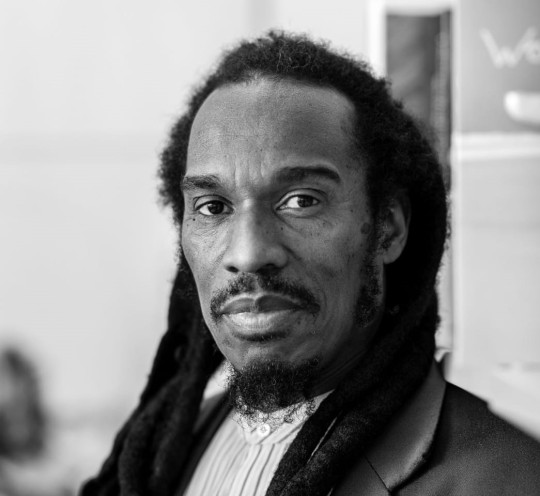
Despite the occasionally visceral and often rebellious nature of his poetry, Benjamin Zephaniah, who has died aged 65 of a brain tumour, had such wide appeal in the UK that he became something close to a national treasure, attracting devotion among all classes and types of people, young as well as old.
With a down-to-earth mission to take poetry wherever he could – and especially to those who would not normally read it – his reach also extended to other parts of the world, where he was respected as a writer and performer who could be relied upon to speak his mind with forthrightness, honesty and self-effacing humour.
From an unpromising start to life in Birmingham, Zephaniah hauled himself into the public eye during the early 1980s by hitching himself to a post-punk caravan of streetwise performance poets such as John Cooper Clarke, Attila the Stockbroker and, at a slightly greater remove, Linton Kwesi Johnson – all of whom eschewed the abstract in favour of writing with a fierce political edge about everyday life.
Focusing initially on the debilitating effects of racism, including through his breakthrough poem Dis Policeman Keeps on Kicking Me to Death, Zephaniah later branched out to consider other topics that were close his heart, including unemployment, homelessness and, as a vegan from the age of 13, animal rights.
In addition to writing novels for adults, he also harnessed his talent for simple language to become a bestselling author for teenagers, with books such as Talking Turkeys (1994) and Windrush Child (2020) that became standard school reading material in multicultural Britain.
Zephaniah was born Benjamin Springer in the Hockley area of Birmingham to Oswald Springer, a post office worker, and Leneve (nee Wright), a nurse, who had emigrated to Britain from Barbados and Jamaica respectively. He had a twin sister, Velda, and six other siblings. Experiencing racism as a child on an almost daily basis, he also felt unhappiness at home, where his father was a distant and violent figure, especially to his mother. When he was 10, after Leneve had received an especially savage beating, she and Benjamin went on the run together.
Living a hand-to-mouth existence, the pair never returned, leaving the other children of the family in estrangement. The dislocation that followed had its effect on Zephaniah: at 13 he was expelled from Broadway school, later spending time in borstal, while in his late teens he was imprisoned for various offences, including affray and burglary.
Poetry, Rastafarianism and an iron will were his salvation. Realising that he was going to face further longer spells in jail or even an early death through gang-related violence, at the age of 22 he left Birmingham and headed for London to be a poet.
One of his first memories of composing poetry had come as a small boy while walking to the corner shop, and, though dyslexic, he had inherited from his mother a great lyrical facility. By the age of 15 he had a reputation as a wordsmith, and when the elders of his mother’s church, feeling he had a prophet-like quality with language, dubbed him Zephaniah (“treasured by God”), the name stuck.
In London he became part of the punk, reggae and alternative comedy scenes, reading his poems during breaks at gigs. His first collection of poetry, Pen Rhythm, was published in 1980 by a co-operative, after which, like Johnson, he began to turn to dub poetry, adding reggae music to his words with a debut album, Rasta (1982).
Soon in demand for radio, TV and film work, Zephaniah played Moses in the film Farendj in 1990 and had a TV play, Dread Poets Society, screened by the BBC the following year. His first novel, Face, about a young man whose life is dramatically changed by facial injuries he receives while joyriding, was published in 1999, but in the preceding years he had continued to produce a steady stream of poetry collections, including The Dread Affair (1985), Inna Liverpool (1988), City Psalms (1992) and Propa Propaganda (1996).
In addition to his 14 poetry books and seven dub poetry albums, over the years he produced further novels and children’s books, as well as seven plays. Among his more high-profile acting roles was a stint as the street preacher Jeremiah Jesus in the TV drama series Peaky Blinders.
In later life he moved from London to Lincolnshire, where he lived quietly, notwithstanding the energy he threw into countless projects. Although committed to widening access and undermining elites, Zephaniah saw this as compatible with academic work, and in 2011 accepted the post of professor of poetry and creative writing at Brunel University, where he was a regular, friendly presence in the staffroom and a committed, hardworking lecturer.
More recently he had been spending three months of the year in China, where he practised tai chi, but, despite his largely peaceable nature, he remained an angry man with a punk sensibility, identifying, he said, most easily with anarchism and observing that “when I see what people have to put up with from their governments, I’m surprised they don’t rise up more often”.
Consistently radical to the end, he refused the offer of an OBE in 2003, and 15 years later scotched any idea that he might become the poet laureate in succession to Carol Ann Duffy by explaining in poetic form: “Don’t take my word, go check the verse / Cause every laureate gets worse”.
His 1990 marriage to Amina, a theatre administrator, ended in divorce in 2001.
🔔 Benjamin Obadiah Iqbal Zephaniah, poet and author, born 15 April 1958; died 7 December 2023
Daily inspiration. Discover more photos at Just for Books…?
11 notes
·
View notes
Text
You called...and we came
You called…and we came.
In ships bigger than anything we had seen,
dwarfing our islands and covering them
in the shadows of smoke and noise.
Crowded, excited voices filled the air,
traveling to the ‘motherland’
– over weeks, over oceans that threatened to engulf us.
Driven by a wish, a call to save, to rebuild
and support efforts to establish ‘health for all’
in the aftermath of war.
You called….and we came.
Women and men of position in our homelands;
nurses with a pride in the excellence of our care.
With experience of management, organisation
and a sense of duty.
We appeared.
Smiling and eager to work on the wards, communities and clinics
of this England.
You called….and we came.
Our big hearts, skilful hands and quick minds
encased in our skins – of a darker hue.
Which had shimmered and glowed
in our sunnier climes..
But now signified our difference
– our un-belonging.
Matrons became assistants
Nurses became like chambermaids.
All the while striving to fulfil our promise
– to succour, to serve, to care.
You called….and we came.
The blue of the sister’s uniform
– seemed as far away from us as the moon.
Unreachable by our dark hands in this cold land.
But we were made of sterner stuff.
The hot sun, which once beat down on our ancestors,
when they too left their lands,
Shone within us.
Forging our hearts and minds
with the resistance of Ebony.
You called….and we came.
Rising like the Phoenix,
from the heat of rejection.
We cared, we worked and we organised.
Until the quickness of our brains
and the excellence of our care
made it hard for you to contain us.
And slowly, so slowly,
the blue uniforms had dark and lighter bodies beneath them.
The professional care in our touch
was valued despite the strangeness of our speech
and the kinks in our hair.
You called….and we came.
A new millennium – new hopes spread across this land.
New populations, engaging and reflecting
the varied, diverse and vibrant nature of these shores.
Challenging and reflecting on leadership for health.
Moves to melt the ‘snow’ at the peaks of our profession.
Recognising the richness of our kaleidoscope nation.
Where compassion, courage and diversity are reflected
In our presence and our contribution:
Not only the hopes and dreams of our ancestors.
– Human values needed to truly lead change…and add value.
Remember… you called.
Remember… you called
YOU. Called.
Remember, it was us, who came.
- Professor Laura Serrant OBE
Today marks 75 years since the HMT Empire Windrush arrived in Britain on 22 June 1948. 800 passengers from the Caribbean arrived in the UK, having been encouraged to make the move to help shore up the workforce after World War II. The Windrush generation and their descendants faced incredible difficulties as they built their lives in the UK. Racism, poor living conditions, and a dismissal of their previous professions and skills were just some of the struggles they faced. And yet the contributions the Windrush generation made to the UK cannot be overstated. The NHS, for example, would not be the insitution it is without the contributions of Caribbean nurses and midwives (who btw are still underrespresented in leadership positions in the NHS today).
I could write an essay tbh but it’s late and I need sleep. I’ve added a few links here which gives way more info on the Windrush generation. And not sure if it’s changed now but when i was at school they never taught us ANY of this.
5 notes
·
View notes
Text
Without Prejudice Mervelee Myers Putting Past 11 Years LEYF Cohorts Systemic Discrimination Impacts Mental Physical Health HMCTS CPS CJS SRA BSB IOPC JCIO DBS CCMCC HMPPS MOPAC CLCC Miscarriages Of Justice Kings College Hospital Foundation Trust 2003-2008 Death Of Walford Byron Alburney Nembard I Represented Self Abandoned By UNISON LEA LSB Southwark Council SEND Section Medical Gaslighting Cover Up Neglect Of ARNOLD EBENEZER TOMLINSON On BYRON Ward 9th March-8th April 4th DJ Sara Elizabeth Beecham Set Stage Trina Philbert To Provoke Me 6th Manhandled African Nurse Betty Called White Security To Remove Me Husband Bedside Windrush Vigil 7th A&E 8th Kings Waited -5 Hours Nurse John Came To Work To Call Me TOM Died 15th Did Psychological Assessment Hospital County Court Clerkenwell Shoreditch Hostile Environment HHJ Richard Roberts Will Be Personally Charged For Breaching Of Equality Act 2010 Protected Characteristics By DJs Grenidge Swan Sterlini Hayes Pigram Bastin Naidoo Beecham Take On Misogyny To Groom Tristan Salter Of Five Paper Chambers Devonshires Solicitors LLP Target Housing For Women Tenants Ms H Presley Lewisham Gag Housing Ombudsman Richard Blakeway Party To Landlords Hate Crimes Am Supporting President Ibrahim Tratore For My Ancestors IN HONOUR OF STRONG WOMEN EVERYWHERE Who Have Been Instrumental In Keeping Families Together Each Time I Experienced A Bereavement Loss I Am Targeted Final Straw Is Dr Phil Gregory Paid To Produce A Medical Report Soon After Husband Died Saying Am Making Up My Disabilities Call Kevin Donovan Murray To Ask If He Thinks I Will Attack Neighbour Turn Up At My House With Nurse Demand I Turn Off Recording Dr Peter Ocansey Georgina Visits I Have Information That Can Topple A-Z Of Abusers Including Richard Harty MIC June O'Sullivan Drag Queen Storytellers Zaiba Qureshi Traffic Asians Hate Mobs Alma Grove I Write For Therapy Father Stricken With Parkinson's The Earth Is The Lord And The Fullness Thereof Joe Hooper Will Be Jailed With Debbie Gilchrist Enough Is Enough In Racist UK Am Strong Jamaican Woman Who Will Not Be Silence By Haters Expert Authority Subjects Cradle To Grave Denied Entitlements I Will Not Negotiate With Satan Am A Child Of A King 2/5/2025
Refer to Without Prejudice Mervelee Myers Defends MM Against HHJ Richard Roberts Drafted In By DJ Sara Elizabeth Beecham 20/3/2025 After She Acted Like Ignorant Member Of HMCTS I Have The Misfortune Dealing With From I Represented MM Kings College Hospital NHS Foundation Trust Dr Maria Hudson Policy Studies Institute Experience Of Multiple Discrimination LEYF Dr Laura Crawford Advice Seek CBT To…
#http://www.justgiving.com/Mervelee-Myers#http://www.myvision.org.uk#https://fight4justiceadvocacy.business.site#https://petition.parliament-uk/helpstandards#https://www.facebook.com#https://www.google.com#https://www.gov.uk/employment-tribunal-decisions#https://www.linkedin.com
0 notes
Text
she's actually my claim to fame tho like she's actually quiet well known windrush migrant in nursing like there are articles abt her crazy
oh no my 100 year old racist english great great great great great aunt has passed away after catapulting out of her wheel chair left unattended n without the brakes locked or whatever by her son
9 notes
·
View notes
Text
Prince William’s speech today at the Windrush Day event was excellent.
“Thank you for inviting Catherine and me. It is a privilege to be here with you all.
Today is a day we celebrate and honour the Windrush Generation and the enormous contribution each and every one of them has made, and continue to make, to our society.
I am delighted that so many of that generation and their children, grandchildren and great-grandchildren are here today.
When the Windrush Generation sailed from the Caribbean to rebuild war torn Britain, they did so as British citizens, answering a plea to help our country thrive again.
Many of them were not strangers to these shores. In the decade before 1948, thousands served in the RAF, either flying, navigating or as ground crew keeping our squadrons airborne – including Allan Wilmot, the eldest Windrush pioneer whose family are with us today.
These people didn’t have to come. They volunteered to fight for King and country – in the full knowledge that many would never make it home again.
As one of the inheritors of that great military tradition I understand how much we owe to these men and women. Today’s ceremony would not be complete without remembering their sacrifice.
Over the past seven decades, the Windrush Generation’s role in the fabric of our national life has been immense.
Today, as we look around us, we can see just how many of the institutions in our country are built by that generation: commerce and manufacturing, sports and science, engineering and fashion.
Here in Waterloo Station, we are reminded of the role played by thousands of people from the Windrush Generation in our essential public transport system – from train drivers to conductors and technical staff.
Although it is not where the passengers of the Empire Windrush first arrived, subsequently many thousands of Caribbean people did pass through Waterloo and dispersed to cities across the UK. So the placement of the monument here is an acknowledgement of the contribution of those people to one of the most important elements of our national infrastructure.
Just down the road, in St Thomas’s Hospital, we can reflect on the Windrush Generation’s huge contribution to the NHS, a service founded only two weeks after the Empire Windrush docked in 1948. Since then, over 40,000 Windrush and Commonwealth nurses and midwives have cared for those in need.
Indeed, every part of British life is better for the half a million men and women of the Windrush Generation.
Be it public life – and we are a stone’s throw from the Borough of Southwark, home to Sam King MBE, Windrush passenger, postman, founder of the West Indian Gazette, the first black mayor in London, campaigner and the co-founder of the Windrush Foundation.
Be it arts and culture – and we need look no further than Floella, the face of children’s television to millions of young people for more than a decade.
There are simply too many people to list. And we know without question, that the Windrush Generation have made our culture richer, our services stronger, and our fellow countrymen safer.
My family have been proud to celebrate this for decades – whether that be through support from my father on Windrush Day, or more recently during my Grandmother’s Platinum Jubilee, as people from all communities and backgrounds came together to acknowledge all that has changed over the past seventy years and look to the future.
This is something that resonated with Catherine and me after our visit to the Caribbean earlier this year. Our trip was an opportunity to reflect, and we learnt so much. Not just about the different issues that matter most to the people of the region, but also how the past weighs heavily on the present.
Sadly, that is also the case for members of the Windrush Generation who were victims of racism when they arrived here, and discrimination remains an all too familiar experience for black men and women in Britain in 2022.
Only a matter of years ago, tens of thousands of that Generation were profoundly wronged by the Windrush Scandal. That rightly reverberates throughout the Caribbean community here in the UK as well as many in the Caribbean nations.
Therefore, alongside celebrating the diverse fabric of our families, our communities and our society as a whole – something the Windrush Generation has contributed so much to – it is also important to acknowledge the ways in which the future they sought and deserved has yet to come to pass.
Diversity is what makes us strong, and it is what reflects the modern, outward-looking values that are so important to our country.
Today, as we stand together to witness Windrush Pioneers, Alford and John unveil Basil’s landmark monument, we are reminded of our shared history and the enormous contribution of the Windrush Generation.
Without you all, Britain would simply not be what it is today.
I want to say a profound thank you to every member of that generation, and the generations that have followed. And I want you to know that you can count on mine and Catherine’s continued support in helping us achieve a future they would be proud of.
Thank you again for inviting us to join you on this important day.”
199 notes
·
View notes
Text
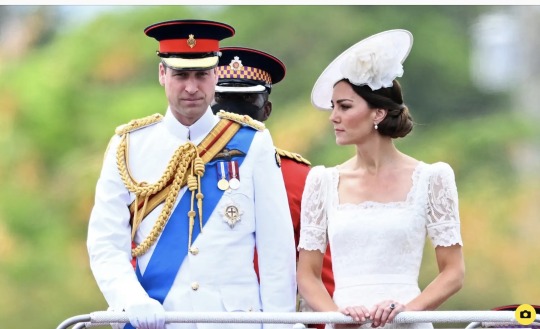
‘Perfect storm’: royals misjudged Caribbean tour, say critics
Calls for slavery reparations and Jamaica’s PM insisting country was ‘moving on’ signal sea change in relations with royals
Rachel Hall and Amelia Gentleman
Published: 18:14 Friday, 25 March 2022
It was supposed to be a visit to mark the Queen’s diamond jubilee – a chance to present the modern face of the British monarchy to a region where republican sentiment is on the rise.
But it really didn’t turn out that way.
When the Duke and Duchess of Cambridge end their week-long tour of the Caribbean on Saturday, they will report back that the tour may have accelerated moves to ditch the Queen as the head of state.
Calls for slavery reparations and the enduring fury of the Windrush scandal followed them across Belize, Jamaica and the Bahamas – overshadowing a trip aimed at strengthening the Commonwealth and discouraging other countries from following Barbados’s example in becoming a republic.
Upon arrival in Belize, the couple were met with protests from villagers over a land dispute involving a charity William is a patron of. In Jamaica, the prime minister told them in an awkward meeting that the country would be “moving on” to become a republic, and a government committee in the Bahamas urged the royals to issue “a full and formal apology for their crimes against humanity”.

The Duchess of Cambridge shakes hands with children during a visit to Trench Town. Photograph: Reuters
From photos of Will and Kate shaking hands with Jamaican children through wire fences, to the military parade in which the pair stood, dressed in white, in an open-top Land Rover, the optics of the visit has been described by local campaigners as a throwback to colonialism.
“This was another photo opportunity, and rather presumptuous to assume that Jamaican people were suddenly going to welcome William and his wife with open arms,” said Velma McClymont, a writer and former Caribbean studies academic who was born in Jamaica and was five when the country gained independence.
“My grandparents could trace generations back to slavery, but they died believing Jamaica was fully independent. Imagine, 60 years later and it’s still an extension of the British empire. It’s an infant colony, not standing alone.”
Followers of the trip in the UK may have gained a different impression. On Friday, the Sun reserved its front page for the tour, gushing that “Kate dazzles on Jamaica tour” and suggesting that the pair had “touched hearts”. On Wednesday, the Daily Mail splashed a photo of Kate, the “diving duchess”, scuba-diving with nurse sharks in Belize.
The same could not be said of the coverage in the Jamaican media. “It was dubbed in [the UK] media as a charm offensive, but I’m not quite so sure it came off that way. It wasn’t a royal failure, but I wouldn’t quite deem it a regal success either,” said Tyrone Reid, an associate editor at national newspaper the Jamaica Gleaner.
Reid added that local publications had devoted considerable column inches to the views of “a growing number of Jamaicans demanding the British monarch and British state apologise for and accept its role in the abhorrent slave trade of years ago.”
Royals experts, including one former palace PR, said that an enormous amount of planning went in to the visits, often starting years in advance. They are led by government in line with Foreign Office diplomatic, culture and commercial priorities.
Philip Murphy, a professor at the University of London and former director of the Institute of Commonwealth Studies, said that although the palace had “taken a relaxed view” about countries removing the Queen as head of state, “the British government has been less consistent about that” – ministers are thought to be anxious to preserve the soft power benefits of the Commonwealth after Brexit.
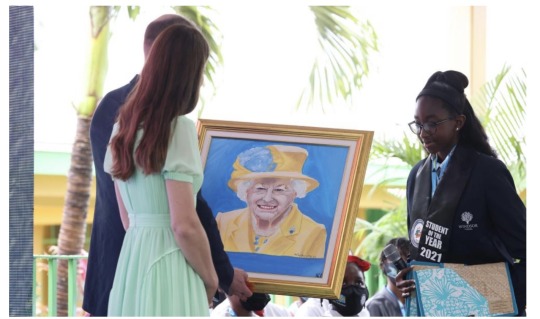
The Duke and Duchess of Cambridge view a portrait of the Queen during a visit to Sybil Strachan primary school in Nassau, the Bahamas.
“I think the Foreign Office is sometimes a bit naive, and it doesn’t have much institutional memory any more. There are profound sensitivities around the legacies of colonialism and slavery and around the royal presence in the Caribbean, and sometimes you get the feeling that the Foreign Office doesn’t quite get it,” he said.
Murphy pointed to the growing emphasis on the relationship between colonialism and racial oppression after the Black Lives Matter movement, along with damage to the royals’ reputations after Meghan Markle’s accusations of racism and the British government through the Windrush scandal. “All of those things make it politically very difficult to stage this visit at this time. You’ve got the makings of a perfect storm,” he said.
A better approach to the trip, said Prof Trevor Burnard, director of the Wilberforce Institute for the Study of Slavery and Emancipation at the University of Hull, would have been for the royals to go prepared to directly acknowledge and apologise for the family’s role in the slave trade, including through memorial visits to sites connected with slavery, such as Kingston harbour, to express sorrow instead of upbeat photo ops.
“They should recognise that members of the royal family from Charles II to William IV were involved with and supported slavery and the slave trade, and that this is part of their past.”
Although a “quiet minority” in Jamaica were supportive of the Queen as head of state, there was “a great deal of antipathy and resentment toward the monarchy”, said Cynthia Barrow-Giles, a professor at the University of West Indies who has researched the British monarchy in the Caribbean. “[The visit] smacks of political opportunism and is disturbingly self-serving,” she said.
Many members of Commonwealth countries in the Caribbean are increasingly questioning its purpose, especially since they have received little support during the pandemic, which has devastated the Jamaican economy and left 120,000 children out of school, and are pointing to unequal access to vaccines, which has resulted in nearly 3,000 deaths in an island of 3 million people.
Jennifer Housen, a lawyer in Jamaica, said the fact the UK revoked visa-free access for Jamaicans in 2003, with applications regularly refused, had led people to feel “the relationship is pointless”.
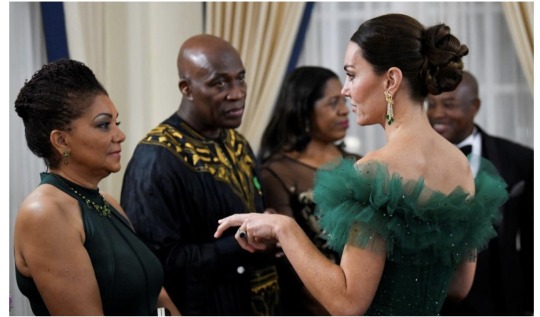
The Duchess of Cambridge attends a dinner hosted by Patrick Allen, governor general of Jamaica, at King’s House, Kingston, Jamaica. Photograph: Toby Melville/PA
“These are discussions we need to be having with them – not pretty flags and smiling black children pushing their hand through chain fences to say: ‘Oh, you know, I’ve touched the royals’; that’s garbage, that’s fostering something that is completely cringeworthy.”
The reparations movement has been growing considerably over the Caribbean in recent years, led by the 15-country strong intergovernmental Caricom Reparations Commission.
Rosalea Hamilton, one of the campaigners for Advocates Network who organised slavery reparations protests in Jamaica, said there was currently a “heightened consciousness of the history”, including “understanding of the legacies of colonialism today, economic, sociological, psychological”. There was, she said, an increased awareness that this had led to trauma in the population that affected confidence levels, along with swathes of the population living in “unhealthy, unsanitary, unsafe” conditions.
Reid said the reparations movement had been “gathering significant steam” in part because of increased access to information about Jamaica’s history that went beyond the school textbooks that had traditionally taught a British interpretation of history.
“The man on the street is demanding reparations as well, it’s not just at the intellectual level. That’s when you know something is really gathering momentum, when it’s spreading across a broad section of society. More people are recognising the horror of slavery and the atrocities that were committed, and becoming aware of the impact that has on modern day life.”
#royals#brf#prince william#kate middleton#british royal family#duke of cambridge#duchess of cambridge#abolish the monarchy#caribbean#belize#jamaica#bahamas#colonialism
34 notes
·
View notes
Text
Something I've noticed lately in the Call the Midwife tag is that a lot of people are focusing on 'Turnadette' to the exclusion of all else... meaning that there's little to no discussion of the events of the episode. No hate to Turner fans, I just find other aspects of the show more interesting, so I wanted to do a recap of the most recent episode and try to start some different conversations about the social issues it highlights.
SPOILERS BELOW!
This episode was a huge one for Lucille and Cyril - let's talk about Lucille first. She's been through a lot this series, first discovering that she was pregnant despite taking the Pill and having to adjust her expectations about what kind of home she would be raising her family in. Then, tragically, just as she was starting to get excited about her pregnancy, she experienced a devastating miscarriage. It was really heartbreaking to watch her deliver another woman's baby while going through so much herself - but as Lucille said, in the delivery room it is only the birthing mother who is important. So as a nurse and midwife, she feels she has to put her own feelings aside and prioritise her patient. But Lucille herself is also in need of care, which is where Phyllis steps in. I've really enjoyed seeing their friendship develop during this series.
Lucille also had to consider how motherhood might affect her career - a question that women are still asking themselves to this day. Retraining as a health visitor sounds like a good compromise, but would it take her away from Nonnatus House?
Cyril, meanwhile, was struggling with his own career path - despite being amply qualified and passionate about civil engineering, he's struggled to find a job in his field because of racism. I think this was really at the heart of his argument with Lucille; he feels powerless and at times resentful of Lucille, who seems to have so many more career opportunities available to her than he does. He even says 'there's no career for me here, a job is just a job' - as a Black man and a member of the Windrush generation, he is expected to work but not to aspire. There's also a gender angle, as he wants to be able to support his family but Lucille doesn't want to give up the career she's worked so hard for, which he misinterprets as a sign that she doesn't have faith in him. Of course Cyril does eventually succeed in getting a job, but I was struck by his conversation with the police officer, who is clearly engaging in racial profiling (still a problem in the Metropolitan Police to this day). Cyril is already at his lowest ebb, and now he's treated as a criminal when he's done nothing wrong. It was a stark reminder of everything that was and is wrong with British society.
Elsewhere, I'm still feeling sceptical of Matthew 'slum landlord' Aylward, but his relationship with Trixie seems to have taken a huge step forward in terms of both physical and emotional intimacy. I'm interested to see where this will lead - especially whether Trixie will ever tell Matthew about her struggles with addiction. Going to Portofino will no doubt remind her of that time in her life, so will she need to lean on Matthew for support?
I also haven't yet discussed the 'patient of the week' storyline about the Packer family. It was a horrifying story of domestic violence and abuse - which, as Trixie points out, are not always the same thing. It also touched on the issue of disabled people being abused by their caregivers, which is a real and urgent problem. Mrs Packer is able to conceal the abuse for a long time, in part because she is white and middle class - without these privileges, would she have been able to resist intervention for as long as she did? However, as we've seen earlier in this series, 'the Welfare' can be rather a blunt instrument when deployed against so-called 'problem families'.
END SPOILERS
This post ended up being much longer than I anticipated, but it just shows how much there is to discuss. Please reply or reblog and share your own thoughts on the episode!
21 notes
·
View notes
Text
Prince William - Windrush Speech 22/06/2022
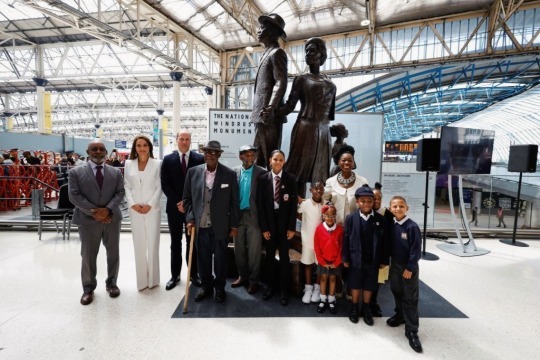
Thank you for inviting Catherine and me. It is a privilege to be here with you all.
Today is a day we celebrate and honour the Windrush Generation and the enormous contribution each and every one of them has made, and continue to make, to our society.
I am delighted that so many of that generation and their children, grandchildren and great-grandchildren are here today.
When the Windrush Generation sailed from the Caribbean to rebuild war torn Britain, they did so as British citizens, answering a plea to help our country thrive again.
Many of them were not strangers to these shores. In the decade before 1948, thousands served in the RAF, either flying, navigating or as ground crew keeping our squadrons airborne – including Allan Wilmot, the eldest Windrush pioneer whose family are with us today.
These people didn’t have to come. They volunteered to fight for King and country – in the full knowledge that many would never make it home again.
As one of the inheritors of that great military tradition I understand how much we owe to these men and women. Today’s ceremony would not be complete without remembering their sacrifice.
Over the past seven decades, the Windrush Generation’s role in the fabric of our national life has been immense.
Today, as we look around us, we can see just how many of the institutions in our country are built by that generation: commerce and manufacturing, sports and science, engineering and fashion.
Here in Waterloo Station, we are reminded of the role played by thousands of people from the Windrush Generation in our essential public transport system – from train drivers to conductors and technical staff.
Although it is not where the passengers of the Empire Windrush first arrived, subsequently many thousands of Caribbean people did pass through Waterloo and dispersed to cities across the UK. So the placement of the monument here is an acknowledgement of the contribution of those people to one of the most important elements of our national infrastructure.
Just down the road, in St Thomas’s Hospital, we can reflect on the Windrush Generation’s huge contribution to the NHS, a service founded only two weeks after the Empire Windrush docked in 1948. Since then, over 40,000 Windrush and Commonwealth nurses and midwives have cared for those in need.
Indeed, every part of British life is better for the half a million men and women of the Windrush Generation.
Be it public life – and we are a stone’s throw from the Borough of Southwark, home to Sam King MBE, Windrush passenger, postman, founder of the West Indian Gazette, the first black mayor in London, campaigner and the co-founder of the Windrush Foundation.
Be it arts and culture – and we need look no further than Floella, the face of children’s television to millions of young people for more than a decade.
There are simply too many people to list. And we know without question, that the Windrush Generation have made our culture richer, our services stronger, and our fellow countrymen safer.
My family have been proud to celebrate this for decades – whether that be through support from my father on Windrush Day, or more recently during my Grandmother’s Platinum Jubilee, as people from all communities and backgrounds came together to acknowledge all that has changed over the past seventy years and look to the future.
This is something that resonated with Catherine and me after our visit to the Caribbean earlier this year. Our trip was an opportunity to reflect, and we learnt so much. Not just about the different issues that matter most to the people of the region, but also how the past weighs heavily on the present.
Sadly, that is also the case for members of the Windrush Generation who were victims of racism when they arrived here, and discrimination remains an all too familiar experience for black men and women in Britain in 2022.
Only a matter of years ago, tens of thousands of that Generation were profoundly wronged by the Windrush Scandal. That rightly reverberates throughout the Caribbean community here in the UK as well as many in the Caribbean nations.
Therefore, alongside celebrating the diverse fabric of our families, our communities and our society as a whole – something the Windrush Generation has contributed so much to – it is also important to acknowledge the ways in which the future they sought and deserved has yet to come to pass.
Diversity is what makes us strong, and it is what reflects the modern, outward-looking values that are so important to our country.
Today, as we stand together to witness Windrush Pioneers, Alford and John unveil Basil’s landmark monument, we are reminded of our shared history and the enormous contribution of the Windrush Generation.
Without you all, Britain would simply not be what it is today.
I want to say a profound thank you to every member of that generation, and the generations that have followed. And I want you to know that you can count on mine and Catherine’s continued support in helping us achieve a future they would be proud of.
Thank you again for inviting us to join you on this important day.
7 notes
·
View notes
Note
Hiii Beth! I hope you're doing well! ❤️ Anyway, I'm pretty interested in #1, if you don't mind: Briefly describe the way their parents grew up, and how it affected the way they raised them.
I hope you're well too!! I've been hoping for this question so...
1. Briefly describe the way their parents grew up, and how it affected the way they raised them.
Matt is from a middle class family, who basically raised him the way they were raised. Overall it was a good environment, but slightly competitive between him and his brothers and his parents were caring albeit slightly distant.
Eve's mother was raised in a strict Catholic household, and although she moved away, she still has some tendencies towards Catholicism. She did try hard to not pass her hang ups onto Eve though, and she did that successfully. Eve's father is not a part of her life and was never a part of her upbringing.
Alex's parents are both Catholic. Their father moved from Portugal in his early teens with his parents. He was forced to adjust to the UK quickly, which hardened him to those outside of church. He met Alex's mother, who is also Catholic, and they married young and had Alex. They were equally strict as their parents (even as Alex's grandparents mellowed) and as a result it created an environment that Alex struggled in and it forced them to push back massively.
Jordan's father is a first generation immigrant who came over from Jamaica to join his father and older brother who were already living in the UK. When he was there he met Jordan's mother, who is a second generation immigrant to parents who came over in as a part of the Windrush. Their family has always enjoyed being active in their community and Jordan was raised as a part of that too. It takes a village to raise a child and Jordan and their siblings were the same.
Char's parents are both working class. His father is from a farming family and his mother is from a family of cleaners and hospital porters. She chose to become a nursery nurse and she's exceptionally compassionate. Because of this, Char couldn't have asked for a better mother. She learnt sign language along with them, and dragged Char's father into it as well. She and Char still use BSL for most of their conversations.
Bo-yeon's parents grew up in a tight knit extended family and that continued into the way xe was raised. Xe loved it and would want to raise children to know xir family as well, even if xe was settled in the UK instead of in South Korea.
#franzinyte-writes#answered <3#alex sancho#matt atkinson#bo yeon park#char graham#eve keane#jordan bridgetower#ro reactions
21 notes
·
View notes
Text
Listening to the BBC this morning and all the Brexiteers and old white people going on and on about how the UK is going to be great once again after Brexit. And how the Brits went through WW II and The Blitz and economic depression and came out stronger and better and they will do so once again after Brexit because the British people are just that special and are just that great unlike the lazy, good for nothing people in other countries. And of course this rhetoric goes unchallenged on TV because the BBC is nothing but a propaganda arm of the British government. British exceptionalism is a hell of a drug.
What these folks fail to realize is that after WWII and the Blitz and the depression, Great Britain still owned a lot of colonies. The Brits owned more of the world than anyone ever has. It was the British empire that made Great Britain rich. The English have invaded around 180 of the 193 countries in the United nations. Think about that.
They grew opium in India, because they owned India, and sold it in China - and when they Chinese resisted, they bombed it, opened China to opium and destroyed the country.
Have people heard of the Windrush generation? The name refers to the ship MV Empire Windrush, that sailed to Britain in 1948, bringing workers from Jamaica, Trinidad and Tobago and other islands, to help fill post-war UK labour shortages. The UK could get cheap labour from their colonies. And to their great shame, it is this generation and their children that the current Tory government is trying to deport back to Jamaica.
They grew cotton in India, destroyed the looms and weavers in India, took the cotton to the UK and developed the British weaving industry.
The East India Company enforced their buyer monopoly in the Indian textile trade with an iron hand. Bolts describes how weavers who either refused to sell to the British or who tried to sell their products to other buyers were oppressed: “...weavers...have, by the Company’s agents, been frequently seized and imprisoned, confined in irons, fined considerable sums of money, [and] flogged…” (194). He also describes how “winders of raw silk, called Nagaads, have been treated also with such injustice, that instances have been known of their cutting off their thumbs, to prevent their being forced to wind silk.”
The Company didn’t just focus on crippling Indian handlooms and weavers in the short-term with their price fixing strategy and enforcing it through violence; they also adopted long-term taxation strategies to ensure that the Indian textile trade would be permanently crippled.
Britain imposed draconian taxes on imports of Indian textiles into Britain, while levying drastically lower taxes on British textiles that were imported into India. Nakatomi (1993) writes that British manufacturers were levied an 85% tax for importing Indian hand woven calico (chintz) and 44% for importing Indian muslin under the British Raj. On the other hand, British textiles were only imposed with a 5% import tax in India.
They looted their colonies for resources and labor. British industries became rich because their colonies had to buy from them. And a lot of the colonies got their independence and went only in the sixties and seventies. And the advantages for the UK continued on for a while.
Unfortunately this is not taught in British schools and the English still think that colonizing the world was an act of benevolence, that they brought civilization to the savages. Never mind that homosexuality is still criminalized in many parts of the world because the British brought their Christian ideals to their colonies and criminalized it. For example, the British criminalized homosexuality in India - Hinduism does not say anything on this topic. The British criminalized homosexuality in Singapore.
The recent controversy around the National Trust wanting to acknowledge that many of the historic buildings, castles, historic homes in Britain has been build using wealth looted from the colonies, proudly displayed many of that loot, and furnishing their homes with that loot. And immediately, the current British government wants to review the funding for the Trust because how dare they link British wealth to colonialism and slavery.
What are they going to do after Brexit? They can no longer destroy their former colonies to develop their own country. An UK outside the EU is less important to the US. Other countries now realize that they can get better deals with the UK because of it’s current weaker position. When there is a shortage of nurses in the NHS, they can longer export cheap labor from the colonies.
Brexit is going to be a painful, agonizing and embarrassing gradual realization that British exceptionalism is not a thing. When Ireland - one of England’s first colonies - offered to send food to the UK if there was a problem, that should have been a humbling experience. But we are not there yet.
79 notes
·
View notes
Text
If you needed a reason to vote out Boris Johnson and the Tories here are some deplorable things they've said and done :
- Boris Johnson has said we should colonise Africa and not feel guilty about it. HE IS A WHITE SUPREMACIST.
- he's staunchly defended the banks who put us in a recession, leading to more austerity while bankers got millions in bonuses.
- Conservatives have cut benefits for single mums, the disabled and generally the most vulnerable in society, while their rich friends line their pockets.
- Windrush deportations
- The Grenfell fire, there is BLOOD on their hands. Even had the audacity to blame the victims (JRM).
- Over one million people using food banks, including nurses and junior doctors
- 120,000+ deaths from austerity.
- Millions of people living in poverty.
#boris johnson#tories#tory#conservative#conservatives#jeremy corbyn#labour#uk#england#london#general election#politics#uk politics
454 notes
·
View notes
Text
Without Prejudice Nye Bevan NHS Founder 1948 No Society Can Legitimately Call Itself Civilised If A Sick Person Is Denied Medical Aid Because Of Lack Of Means Mervelee Myers IN HONOUR Of STRONG WOMEN EVERYWHERE Signed At A New Met For London Launch By Sir Mark Rowley After DJs Sterlini Rand Zimmell Strike Winsome Duncan Claim Stolen Manuscript Sent Police London Ambulance Service To Section Me I Wrote Facebook I Am Feeling Suicidal Label Disabled Pensioner A Violent Nuisance During CRISIS When I Was Not Informed About Court Order K05EC530 Breach Amended Housing Act 1988 Eviction Act 1977 Bereavement Losses Traumas Of Disabilites Poverty Recurring Nelson Mandela Purpose Of Freedom Is To Create For Others Writing Since Father Stricken With Parkinson's CPPDP Intellectual Property Copyright Pedagogy Harvested Built Brands Am Voiceless Vulnerable Victim Of HMCTS Systemic Discrimination CPS CJS SRA BSB IOPC JCIO DBS CCMCC HMPPS MOPAC CLCC Target Me To Cover Miscarriages Of Justice Left Me With No GP Dr Phil Gregory Medical Gaslighting Turn Up At My House With Nurse Unannounced Day After Housing Ombudsman Service Zoom Ricard Blakeway Must Be Charge Crime No 4221169/23100 Notice & Demand 202209407 Party To Housing For Women Trafficking ASIAN EAL Men As Contractors Female Employees Prostitutes Housed In Flats DJ Beecham Get Tenants Evicted HHJ Richard Roberts Imposed Suspended Sentence We Need To Reference Dr Maria Hudson Experience Of Multiple Discrimination Policy Studies Institute Recommended To ACAS Dr Faith Matcham Kings College London RADAR-CNS Parkinson's UK Cancer Research Macmillan Fundraising Interviews Why Face Of Windrush 70 Wife Of Arnold Ebenezer Tomlinson Whose Online Profile Will Prove To The World That Modern Slavery Thriving In Great Britain Where Children Abused In LEYF Nurseries Reviews 2017 I Petition Inquiry EYFS Young People Indoctrinated UEL Richard Harty Panic Called Mobile Female Taken Neglected Husband's Bedside Manhandled Unlawful Injunction Contempt Of Court For Truths About Why Ms H Presley And I Are Facing Eviction Imprisonment Joe Hooper At 16 Alma Grove Terrorising Me When Does One Accept Suicide As An Option To Homelessness I Told DJ Beecham If I Become HCT Group Impact Report 1 In 5 Of All Suicides Associated With Unemployment 20/3/25 She Left Me To Triggered By Ranting Raving Lunatic With A Dead Sheep On His Head The Truth Is Written In Fight4justice 28/4/2025
Refer to https://mervelee.com/2025/04/27/without-prejudice-mervelee-myers-tackles-housing-for-women-zaiba-qureshi-asian-modern-slavery-thriving-in-uk-traffic-eal-male-female-indentured-labourers-in-jamaica-no-blacks-no-dogs-no-irish-abandon/ Without Prejudice Mervelee Myers Name Housing For Women Claim No K05EC530 Order For Possession County Court At Clerkenwell Shoreditch The Gee Street…
#http://worldreferee.com/referee/valdin-legister/bio#http://www.myvision.org.uk#https://fight4justiceadvocacy.business.site#https://mervelee.files.wordpress.com/2010/#https://petition.parliament-uk/helpstandards#https://www.facebook.com#https://www.google.com#https://www.gov.uk/employment-tribunal-decisions#https://www.linkedin.com
0 notes